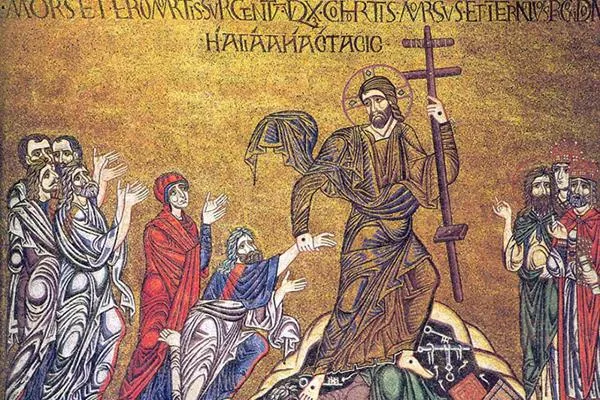Why Did Jesus Descend into Hell?

by Fr. Dan Cambra, MIC
Let it be known: There's no such thing as a stupid question.
Take for instance the one recently posed to me at a parish mission. During a break, a woman approached me and, rather sheepishly, said, "Father, every Sunday at Mass we pray the Creed, and after all these years I have to admit that I have no idea what we mean when we speak of Jesus descending into hell. Why did Jesus descend into hell?"
She had no reason for embarrassment. It's a great question. And with this issue of the newsletter, I hereby arm you with the answer because — who knows? — maybe you, too, recite the Creed with an image in your mind of Jesus hanging out with Lucifer for three days.
That's not what He was up to, by the way.
When we say Jesus "descended into hell" — an event that theologians call the "harrowing of hell" — we first must understand that the word "hell," in this case, is a loose translation of Hebrew and Greek terms that pre-date Christ and refer in general to the realm of the dead. The Hebrews called this realm Sheol. The Greeks called it Hades.
(By the way, if you really want to impress friends and family, tell them that our English word "hell" comes from a Germanic name for the place of the dead in Teutonic mythology.)
In the strictest sense of the word, hell is the abode of the dead where there is an absence of the Beatific Vision. While to our modern ears "hell" has come to represent the fiery realm of the damned, in Scripture — and in the Creed — the "hell" in question held both the righteous and evil "while they await the redeemer" (Catechism of the Catholic Church, 633).
Saint Thomas Aquinas and other Church scholars conceptualized this realm of the dead by dividing it into four states or abodes:
1. Limbo of the Children, the abode for unbaptized children under the age of reason, a place of happiness (note, however, Limbo of the Children is not an official Church teaching);
2. Limbo of the Fathers, also known as the bosom of Abraham (this is the abode of the Old Testament faith, which Christ emptied by His redemption);
3. Purgatory (the abode of those
being purified for Heaven); and
4. Gehenna (the abode of the eternally damned, who have rejected God in this life and have committed mortal sins without repentance — what we in English now call "hell").
So what about Christ's descent? As you know, and as the Catechism clarifies in passage 633, the dead do not all share identical fates. Our Lord attested to this "realm of the dead" understanding of hell in His Parable of the Rich Man and Lazarus (see Lk 16:19-31). Upon their death, the rich man goes to a place of eternal suffering while Lazarus, the poor man, goes to a place most Jews would identify as the bosom of Abraham, or Limbo of the Fathers, a quiet place of rest for the souls of those who have died in God's grace — but it's not Heaven.
Remember, Christ is telling the story, so He hasn't yet died and risen from the dead, so it would be impossible for Lazarus and Abraham to be in Heaven itself because Christ had not yet opened the gates of Heaven by His redemptive act. The sin of Adam and Eve had closed the gates of Heaven. Holy souls such as Adam, Eve, Abraham, Moses, etc., awaited the Redeemer in this realm of the dead. It's not until Christ reconciles us to the Father by His redemptive act on the Cross that He can then rise from the dead and receive authority from the Father to reopen the gates of Heaven for us and all the redeemed.
So when we say in the Creed that Christ descended into hell, we acknowledge that He went to free the just who had died before Him. As the Catechism teaches, "Jesus did not descend into hell to deliver the damned, nor to destroy the hell of damnation, but to free the just who had gone before him. ... [T]he descent into hell brings the Gospel message of salvation to complete fulfillment. This is the last phase of Jesus' messianic mission ..." (633-634).
In closing, let me point you to an ancient homily of the early Church for Holy Saturday that captures this event. As quoted in the Catechism (635), the homily goes thusly:
Today a great silence reigns on earth, a great silence and a great stillness. A great silence because the King is asleep. The earth trembled and is still because God has fallen asleep in the flesh and he has raised up all who have slept ever since the world began. ... He has gone to search for Adam, our first father, as for a lost sheep. Greatly desiring to visit those who live in darkness and in the shadow of death, he has gone to free from sorrow Adam in his bonds and Eve, captive with him — He who is both their God and the son of Eve. ... "I am your God, who for your sake have become your son. ... I order you, O sleeper, to awake. I did not create you to be a prisoner in hell. Rise from the dead, for I am the life of the dead."
Father Dan Cambra, MIC, is the spiritual director of the Marian Fathers' Holy Souls Sodality.
